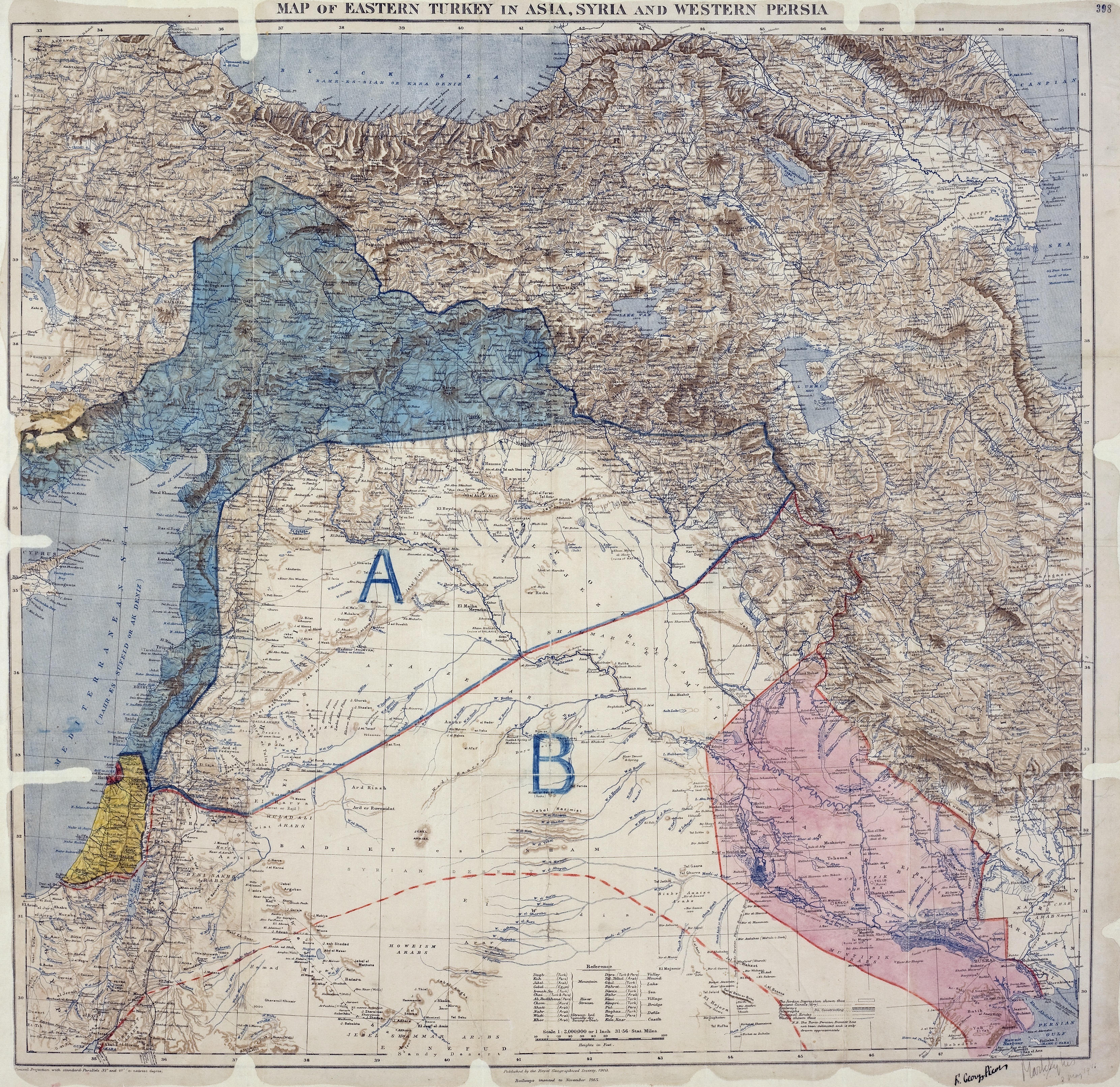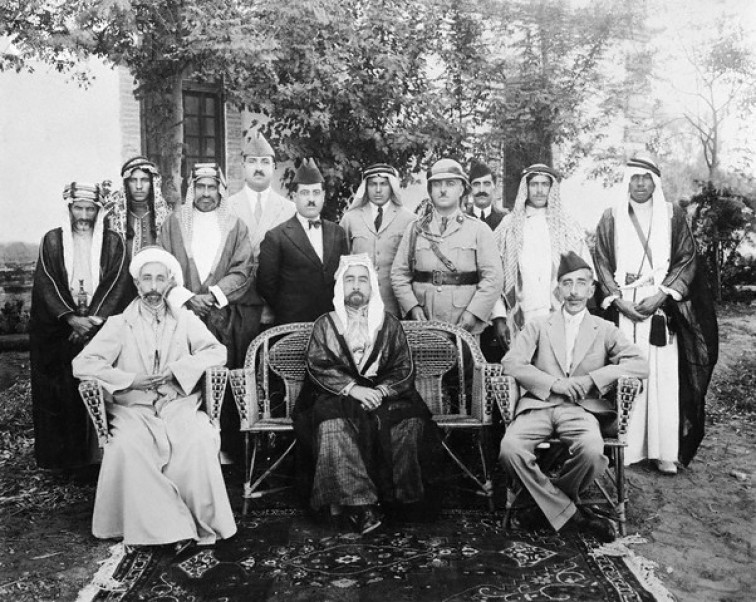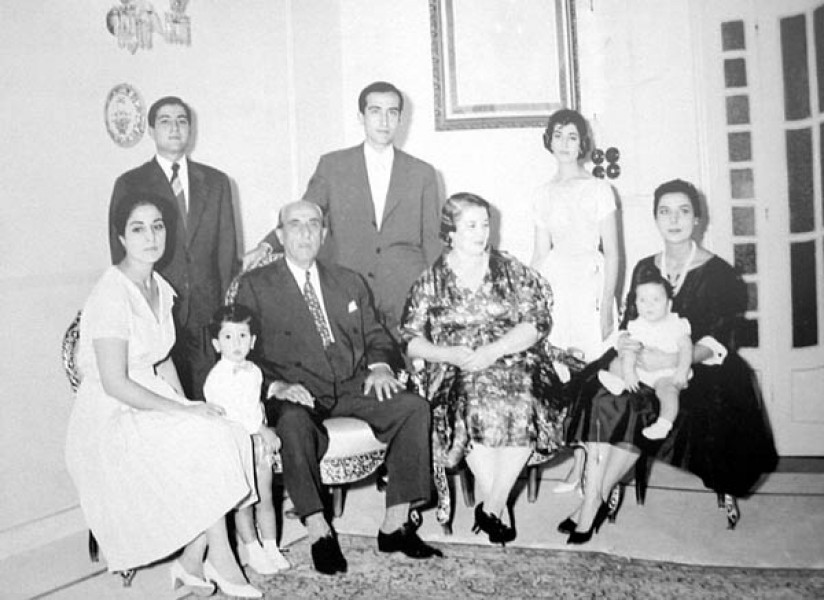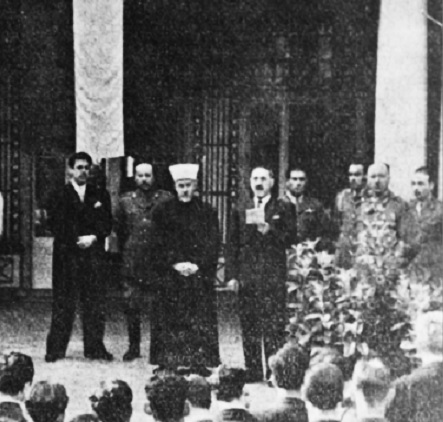|
Badawi Al-Jabal
Muhammad Sulayman al-Ahmad (1903– August 19, 1981) ( ar, محمد سليمان الأحمد), better known by his pen name Badawi al-Jabal ( ar, بدوي الجبل), was a Syrian poet known for his work in the neo-classical Arabic form. According to anthologist Salma Khadra Jayyusi, Badawi was "one of the greatest poets of the old school".Jayyusi, 1987, p. 61. Early life Badawi was born in 1903 to an Alawite family in the village of Difa, near al-Haffa, in the Latakia District.Moubayed, 2006, p. 542. His father, Sheikh Sulayman al-Ahmad, was a prominent Alawite imam from the Kalbiyya tribal confederation, and also served in the Damascus-based Arab Academy of Language in 1919.Seale, 1990, p. 19. Badawi developed an early understanding of the Qur'an and classic Arabic poems from his father.Auden, 2005, p. 1.Meismani, 1998, p. 121. Following the French occupation of Syria in the aftermath of World War I, Badawi joined the Al-Ali Revolt, which centered in the Syrian coast ... [...More Info...] [...Related Items...] OR: [Wikipedia] [Google] [Baidu] |
:Template:Infobox Writer
{{Infobox , bodyclass = vcard , bodystyle = {{#if:{{{box_width , width:{{{box_width}; , child = {{lc:{{{embed } , title = {{#ifeq:{{lc:{{{embed }, yes, Writing career , abovestyle = font-size:125%; , above = {{#ifeq:{{lc:{{{embed }, yes, , {{#if:{{{honorific prefix, {{{honorific_prefix, {{{honorific-prefix} } , {{{honorific prefix, {{{honorific_prefix, {{{honorific-prefix }{{{name, {{PAGENAMEBASE }{{#if:{{{honorific suffix, {{{honorific_suffix, {{{honorific-suffix} } , {{{honorific suffix, {{{honorific_suffix, {{{honorific-suffix } , image = {{#invoke:InfoboxImage, InfoboxImage , image={{{image , size={{{image_size, {{{imagesize} , sizedefault=frameless , upright={{{image_up1} , alt={{{alt , title={{{caption , suppressplaceholder=yes , caption = {{{caption , captionstyle = line-height:1.4em; , labelstyle = line-height:1.2em; padding-right:0.65em; , datastyle = line-height:1.4em; , label1 = Native name , data1 = {{#if:{{{native_name , {{{native_name ... [...More Info...] [...Related Items...] OR: [Wikipedia] [Google] [Baidu] |
Great Syrian Revolt
The Great Syrian Revolt ( ar, الثورة السورية الكبرى) or Revolt of 1925 was a general uprising across the State of Syria and Greater Lebanon during the period of 1925 to 1927. The leading rebel forces comprised fighters of the Jabal Druze State in southern Syria, joined by Sunni, Druze, Alawite, and Christian factions. The common goal was to end French rule in the newly mandated regions, passed from Turkish to French administration following World War I. This revolution came in response to the repressive policies pursued by the French authorities under the Mandate for Syria and Lebanon, in dividing Syria into several occupied territories. The new French administration was perceived as being prejudiced against the dominant Arab culture and of intending to change the existing character of the country. In addition resentment was caused by the refusal of the French authorities to set a timetable for the independence of Syria. This revolution was an extension of ... [...More Info...] [...Related Items...] OR: [Wikipedia] [Google] [Baidu] |
Hashemite
The Hashemites ( ar, الهاشميون, al-Hāshimīyūn), also House of Hashim, are the royal family of Jordan, which they have ruled since 1921, and were the royal family of the kingdoms of Hejaz (1916–1925), Syria (1920), and Iraq (1921–1958). The family had ruled the city of Mecca continuously from the 10th century, frequently as vassals of outside powers, and were given the thrones of the Hejaz, Syria, Iraq, and Jordan following their World War I alliance with the British Empire; this arrangement became known as the "Sharifian solution". The family belongs to the Dhawu Awn, one of the branches of the Ḥasanid Sharifs of Mecca, also referred to as Hashemites. Their eponymous ancestor is traditionally considered to be Hashim ibn Abd Manaf, great-grandfather of the Islamic prophet Muhammad. The Ḥasanid Sharifs of Mecca (from whom the Hashemite royal family is directly descended), including the Hashemites' ancestor Qatadah ibn Idris, were Zaydī Shīʿas until the l ... [...More Info...] [...Related Items...] OR: [Wikipedia] [Google] [Baidu] |
Republicanism
Republicanism is a political ideology centered on citizenship in a state organized as a republic. Historically, it emphasises the idea of self-rule and ranges from the rule of a representative minority or oligarchy to popular sovereignty. It has had different definitions and interpretations which vary significantly based on historical context and methodological approach. Republicanism may also refer to the non-ideological scientific approach to politics and governance. As the republican thinker and second president of the United States John Adams stated in the introduction to his famous '' A Defense of the Constitutions of Government of the United States of America,'' the "science of politics is the science of social happiness" and a republic is the form of government arrived at when the science of politics is appropriately applied to the creation of a rationally designed government. Rather than being ideological, this approach focuses on applying a scientific methodology to ... [...More Info...] [...Related Items...] OR: [Wikipedia] [Google] [Baidu] |
Shukri Al-Quwatli
Shukri al-Quwatli ( ar, شكري القوّتلي, Shukrī al-Quwwatlī; 6 May 189130 June 1967) was the first president of post-independence Syria. He began his career as a dissident working towards the independence and unity of the Ottoman Empire's Arab territories and was consequently imprisoned and tortured for his activism. When the Kingdom of Syria was established, Quwatli became a government official, though he was disillusioned with monarchism and co-founded the republican Independence Party. Quwatli was immediately sentenced to death by the French who took control over Syria in 1920. Afterward, he based himself in Cairo where he served as the chief ambassador of the Syrian-Palestinian Congress, cultivating particularly strong ties with Saudi Arabia. He used these connections to help finance the Great Syrian Revolt (1925–1927). In 1930, the French authorities pardoned Quwatli and thereafter, he returned to Syria, where he gradually became a principal leader of the Na ... [...More Info...] [...Related Items...] OR: [Wikipedia] [Google] [Baidu] |
National Party (Syria)
The National Party ( ar, الحزب الوطني ''al-Ḥizb al-Waṭanī''; french: Parti National) was a Syrian political party founded in 1947, eventually dissolving in 1963, after the Arab Socialist Ba'ath Party – Syria Region, Syrian Ba'ath Party established one-party rule in Syria in a 1963 Syrian coup d'état, coup d'état. It grew out of the National Bloc (Syria), National Bloc, which opposed the Ottoman Turks, Ottomans in Syria, and later demanded independence from the Mandate for Syria and the Lebanon, French mandate. The party saw the greatest support among the Damascus, Damascene old guard and industrialists. It supported closer ties with the Arab countries and territories to Syria's south, mainly Saudi Arabia, Kingdom of Egypt, Egypt, Lebanon, and Mandatory Palestine, although it began supporting Hashemites, Hashemite-ruled Kingdom of Iraq, Iraq and Jordan starting in 1949 amongst growing public support. While the dominant party in 1940s and early 1950s, it was repl ... [...More Info...] [...Related Items...] OR: [Wikipedia] [Google] [Baidu] |
Parliament Of Syria
The People's Assembly ( ar, مَجْلِس الشَّعْب, ) is Syria's legislative authority. It has 250 members elected for a four-year term in 15 multi-seat constituencies. There are two main political fronts; the National Progressive Front and Popular Front for Change and Liberation. The 2012 elections, held on 7 May, resulted in a new parliament that, for the first time in four decades, is based on a multi-party system. In 1938, Fares Al-Khoury became the first Christian to be elected Speaker. In 2016 Hadiya Khalaf Abbas, Ph.D., representing Deir Ezzor since 2003, became the first woman elected to be the Speaker. In 2017, Hammouda Sabbagh became the first Syriac Orthodox Christian to have held the post. The assembly meets at least three times a year and in special occasions called by the council's president or the president of the country. Latest elections The last elections were held on the 19 July 2020. Several lists were allowed to run across the country but any re ... [...More Info...] [...Related Items...] OR: [Wikipedia] [Google] [Baidu] |
National Bloc (Syria)
The National Bloc ( ar, الكتلة الوطنية ''Al-Kutlah Al-Wataniyah''; French: ''Bloc national'') was a Syrian political party that emerged to fight for Syrian independence during the French Mandate of Syria period. History The party was created after a national conference in 1928, by Ibrahim Hananu. It was not a structured party but rather a coalition of parties hostile to the French presence in Syria. The Bloc was led by notable conservatives; land owners, tradesmen, lawyers, etc. This coalition gathered the fifty most rich and powerful families of Syria. The political involvement of these notable people in the struggle for independence is reminiscent of the political struggle carried out in their youth against the Ottoman Empire. The National Bloc had no precise ideology, nor a social and economic agenda. The main objective which drove the movement forward was to return Syria's independence through diplomatic and non-violent actions. Legacy Full independence for Sy ... [...More Info...] [...Related Items...] OR: [Wikipedia] [Google] [Baidu] |
Rashid Ali
Rashid Ali al-Gaylaniin Arab standard pronunciation Rashid Aali al-Kaylani; also transliterated as Sayyid Rashid Aali al-Gillani, Sayyid Rashid Ali al-Gailani or sometimes Sayyad Rashid Ali el Keilany ("Sayyid, Sayyad" serves to address higher standing male persons) ( ar, رشيد عالي الکَيلاني, ) (1892 – 28 August 1965) was an Iraqi politician who served as List of Prime Ministers of Iraq, Prime Minister of the Kingdom of Iraq on three occasions: from March to November 1933, from March 1940 to February 1941 and from April to May 1941. He is chiefly remembered as an ardent Arab nationalism, Arab nationalist who attempted to remove the United Kingdom, British influence from Iraq by starting a coup against the government in 1941. During his brief tenures as Prime Minister in 1940 and 1941, he attempted to negotiate settlements with the Axis powers during World War II in order to counter British influence in Iraq. Early life Rashid Ali was the son of Sayyid Abdul ... [...More Info...] [...Related Items...] OR: [Wikipedia] [Google] [Baidu] |
University Of Baghdad
The University of Baghdad (UOB) ( ar, جامعة بغداد ''Jāmi'at Baghdād'') is the largest university in Iraq, tenth largest in the Arab world, and the largest university in the Arab world outside Egypt. Nomenclature Both University of Baghdad and Baghdad University are used interchangeably. History The College of Islamic Sciences claims that it originated in 1067 A.D. as Abu-Haneefa. However, the College of Law, the earliest of the modern institutions that were to become the first constituent Colleges (i.e. Faculties) of the University of Baghdad, was founded in 1908. The College of Engineering was established in 1921; the Higher Teachers Training College and the Lower College of Education in 1923, the College of Medicine in 1927, and the College of Pharmacy in 1936. In 1942, the first higher institution for girls, Queen Alia College, was established. In 1943, proposals for further new Colleges appeared, leading to the foundation of the College of Arts and the C ... [...More Info...] [...Related Items...] OR: [Wikipedia] [Google] [Baidu] |
Arabic Language
Arabic (, ' ; , ' or ) is a Semitic language spoken primarily across the Arab world.Semitic languages: an international handbook / edited by Stefan Weninger; in collaboration with Geoffrey Khan, Michael P. Streck, Janet C. E.Watson; Walter de Gruyter GmbH & Co. KG, Berlin/Boston, 2011. Having emerged in the 1st century, it is named after the Arab people; the term "Arab" was initially used to describe those living in the Arabian Peninsula, as perceived by geographers from ancient Greece. Since the 7th century, Arabic has been characterized by diglossia, with an opposition between a standard prestige language—i.e., Literary Arabic: Modern Standard Arabic (MSA) or Classical Arabic—and diverse vernacular varieties, which serve as mother tongues. Colloquial dialects vary significantly from MSA, impeding mutual intelligibility. MSA is only acquired through formal education and is not spoken natively. It is the language of literature, official documents, and formal written m ... [...More Info...] [...Related Items...] OR: [Wikipedia] [Google] [Baidu] |
University Of Damascus
The University of Damascus ( ar, جَامِعَةُ دِمَشْقَ, ''Jāmi‘atu Dimashq'') is the largest and oldest university in Syria, located in the capital Damascus and has campuses in other Syrian cities. It was founded in 1923 through the merger of the School of Medicine (established 1903) and the Institute of Law (established 1913). Until 1958, it was named the Syrian University, but the name changed after the founding of the University of Aleppo. Damascus University was one of the most reputable universities in the Arab World before the war in Syria started in 2011. The University of Damascus consists of several faculties, higher Institutes, intermediate institutes and a school of nursing. One of the institutions specializes in teaching the Arabic language to foreigners, which is the largest institution of its kind in the Arab world. History In 1901, the establishment of the Office of the School of Medicine in Damascus was approved and in 1903 this school, which ... [...More Info...] [...Related Items...] OR: [Wikipedia] [Google] [Baidu] |







